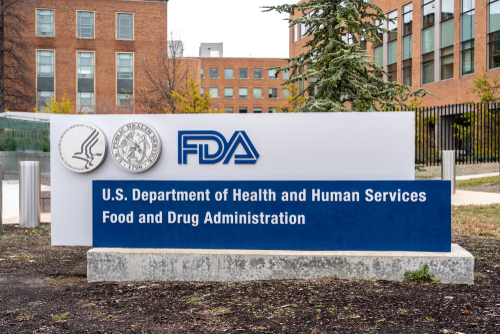
The US Food and Drug Administration (FDA) has issued a Complete Response Letter for the Biologics License Application (BLA) for a fixed combination of amivantamab and recombinant human hyaluronidase for subcutaneous administration in patients with non-small cell lung cancer (NSCLC) who have EGFR mutations, according to a news release from Johnson & Johnson.
The Complete Response Letter “is related to observations as part of a standard pre-approval inspection at a manufacturing facility,” Johnson & Johnson officials said in the news release, explaining that the letter “is unrelated to the product formulation, or the efficacy and safety data submitted in the regulatory application, and the FDA has not requested any additional clinical studies.”
This follows the FDA’s August 2024 move to grant Priority Review for the BLA for subcutaneous amivantamab as a treatment for patients with NSCLC with EGFR exon 19 deletions (ex19del) or L858R substitution mutations. The currently approved intravenous formulation of amivantamab-vmjw is not impacted by the Complete Response Letter, officials emphasized.
“We’re working closely with the FDA to bring [subcutaneous] amivantamab to patients as quickly as possible, and are confident in our path to resolution,” said Yusri Elsayed, MD, MHSc, PhD, Global Therapeutic Area Head, Oncology, Innovative Medicine, Johnson & Johnson.
“Backed by interim overall survival data showing a strong favorable trend compared to osimertinib, we believe strongly in the robust efficacy and safety of RYBREVANT–both as a standalone treatment and in combination with LAZCLUZE–for EGFR-mutated advanced lung cancer,” Dr. Elsayed said. “We’re proud to have helped so many patients in the front-line setting already with RYBREVANT and look forward to further expanding treatment options with our subcutaneous formulation pending regulatory review and approval.”
The BLA is based on the phase 3 PALOMA-3 study results presented at the 2024 American Society of Clinical Oncology Annual Meeting and published in the Journal of Clinical Oncology, officials said. Amivantamab is currently approved in over 60 countries worldwide.
Source: Johnson & Johnson







 © 2025 Mashup Media, LLC, a Formedics Property. All Rights Reserved.
© 2025 Mashup Media, LLC, a Formedics Property. All Rights Reserved.